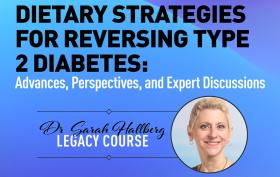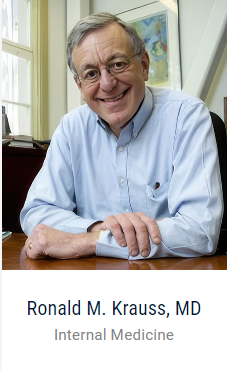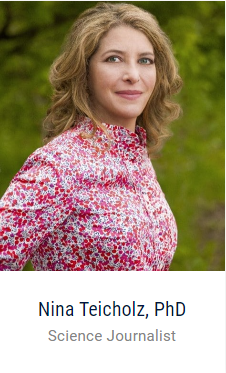
Dietary Strategies for Reversing Type 2 Diabetes: Advances, Perspectives, and Expert Discussions
Dr. Ronald M. Krauss, MD, Professor of Medicine at UCSF and Adjunct Professor of Nutritional Sciences at UC Berkeley, and Nina Teicholz, PhD, author and science journalist, co-organized this course on Dietary Approaches to Reversing Type 2 Diabetes. The course is offered as a legacy to the late Dr. Sarah Hallberg, a pioneer in the research and promotion of putting type 2 (T2) diabetes into remission—or “reversal” of the disease, as she preferred to describe the process of restoring average blood sugar (A1c) to normal levels while eliminating the need for all or most medications.
Contrary to the common belief that type 2 diabetes is a lifelong, ever-worsening progressive and chronic condition, the disease can be put into remission, sustainably, through changes in diet alone. This course addresses the science and practice of the nutritional therapies that achieve these results.
The course covers the definitions of remission and “reversal,” the definition and pathophysiology of type 2 diabetes, the metabolic basis for low-carbohydrate and ketogenic diets, a review of the clinical trial evidence for T2 reversal through dietary approaches, the practical approaches to implementing and maintain low-carbohydrate diets, and a review of patient cases, as well as a panel discussion with audience questions.
The faculty presenting are some of the top researchers in the field, including Jeff Volek, PhD, RD, a Professor at The Ohio State University; Dr Tony Hampton, MD, MBA, MS-HNFM, ABOM, a doctor in Chicago who is board certified in Family and Obesity Medicine as well as Advocate Midwest Primary Care Service Line Leader South Region Chicago; Benjamin Bikman, PhD, a Professor in the Department of Cell Biology and Physiology and Director of the Diabetes Research Lab at Brigham Young University; Ronesh Sinha, MD, the Medical Director of Metabolic Wellness Program at Sutter Health; and Laura Saslow, PhD, an Associate Professor at the University of Michigan.
For those interested in Dr. Sarah Hallberg’s memoir, mentioned in the course, it is available for purchase on Amazon.
Target Audience
The educational design of this activity is for any interested members of the public as well as healthcare professionals, including primary care clinicians (PCPs), cardiologists, endocrinologists, lipidologists, registered nurses, advanced practice registered nurses, pharmacists, and other allied health professionals involved in the management and treatment of cardiometabolic patients.
Learning Objectives
After completing this activity, the participant should be better able to:
- Review the definitions of type 2 diabetes reversal
- Discuss the key metabolic disturbances and pathophysiology of type 2 diabetes
- Provide an overview of the role of dietary and nutrition interventions for type 2 diabetes reversal, including low-carbohydrate and low-calorie diets
- List the efficacy and safety of low-carbohydrate interventions for type 2 diabetes reversal
- Discuss practical approaches for the initiation and maintenance of a low-carbohydrate diet for type 2 diabetes reversal
- pply low-carbohydrate interventions as part of a comprehensive treatment regimen for type 2 diabetes reversal
Additional Information
 | Ronald M. Krauss, MD Professor of Medicine at UCSF Adjunct Professor of Nutritional Sciences at UC Berkeley |
 | Benjamin Bikman, PhD Professor, Department of Cell Biology and Physiology Director, Diabetes Research Lab Brigham Young University |
 | Nina Teicholz, PhD Science Journalist |
 | Sarah Hallberg, DO, MS |
 | Jeff Volek, PhD, RD Professor, The Ohio State University |
 | Tony Hampton, MD, MBA, MS-HNFM, ABOM Family and Obesity Medicine Board Certified Advocate Midwest Primary Care Service Line Leader South Region Chicago |
 | Laura Saslow, PhD Associate Professor, University of Michigan |
 | Ronesh Sinha, MD Medical Director of Metabolic Wellness Program at Sutter Health |
ESTIMATED TIME TO COMPLETE ACTIVITY
4.5 hours
The last 30 minutes of the course are not available for credit.
EDUCATIONAL GRANT SUPPORT
Supported solely by a memorial fund in honor of the late Dr. Sarah Hallberg.
CONTINUING EDUCATION
CPD Standards Office designates this enduring material for a maximum of 4.0 credits, Category 1. Healthcare professionals should claim only the credit commensurate with the extent of their participation in the activity. All Allied Healthcare Professionals may obtain credits; however, you might check that your governing body will approve these credits.
Any questions or requests for help in securing credit should be directed to: [email protected].
METHOD OF PARTICIPATION & REQUEST FOR CREDIT
There are no fees for this activity. Participation in this self-study activity should be completed in approximately 4.5 hours. To successfully complete this activity and receive CPD credit, learners must follow these steps:
- Review the objectives and disclosures
- Study the educational content
- Successfully complete activity post-test(s)
- Complete the activity evaluation
You must respond to all evaluation questions to receive a certificate. Upon completion, your certificate will be available for print. For questions about receiving certificates, please contact [email protected].
DISCLOSURES
The CPD Standards Office requires every individual in a position to control educational content to disclose all financial relationships with ineligible companies that have occurred within the past 24 months. Ineligible companies are organizations whose primary business is producing, marketing, selling, re-selling, or distributing healthcare products used by or on patients.
All relevant financial relationships for anyone with the ability to control the content of this educational activity are listed below and have been mitigated according to CPD Standards Office. All others involved in the planning or presentation of this activity report no conflicts of interest.
Jeff Volek reports owning stock in Virta Health, a diabetes reversal company.
Available Credit
- 4.00 Participation
Required Hardware/software
A computer with an internet connection
Internet Browser: Internet Explorer 7.x or higher, Firefox 4.x or higher, Safari 2.x or higher, or any other W3C standards compliant browser
Other additional software may be required such as PowerPoint or Adobe Acrobat Reader.

 Facebook
Facebook X
X LinkedIn
LinkedIn Forward
Forward